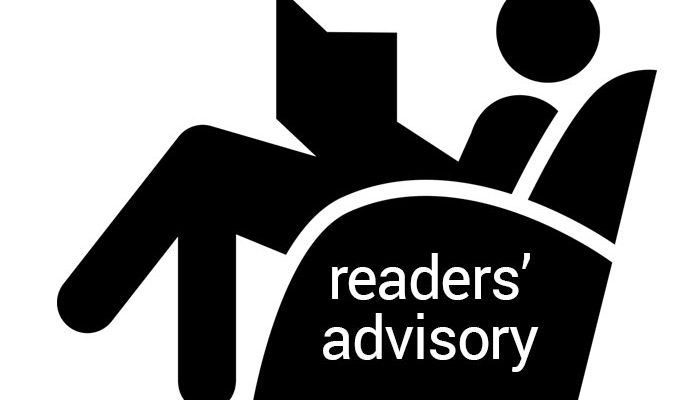It’s a new year and a great time for making reading resolutions. One form this resolution may take is to respond to a Reading Challenge. Taking this type of challenge can not only be fun, but also a great opportunity to change some of our entrenched reading habits.

Reading about Reading: Elevate Your Work from a Job to a Passion
In her 1979 book, Language of the Night, Ursula K. Le Guin observed that many people are anti-fiction:
“We tend, as a people, to look upon all works of the imagination either as suspect, or as contemptible.”
Reading for pleasure, she argued, has traditionally been viewed as self-indulgent and escapist. Thirty-five years later vestiges of such thinking still linger. Some library customers are hesitant or even apologetic when asking readers’ advisory questions; others are unaware that the service exists. The unspoken assumption is that questions about leisure reading are not “worthy” in the same way that information queries are. By extension, library staff may consider readers’ advisory work as less important than their other duties.
A growing number of studies are challenging some of the tacit assumptions about reading. If you work in a library, consider such works as essential professional development resources. Reading about reading will change the way you think about the activity, and may, in fact, influence your perception of your occupation. We all want to believe that our jobs are meaningful, that we are making a difference. This belief can shape our thinking, making all of our efforts seem worthwhile.
Recent research about reading provides the underpinning that can transform your work from a simple job into something more—a calling, a passion, a dedicated profession.
Whether found in novels, nonfiction works, movies, or even anecdotes, stories naturally attract us. In The Story Species (2002), Joseph Gold argues that story evolved as a survival adaption tool by helping us make sense of the world. Similarly Jonathan Gottschall believes that pleasure reading holds innate fascination for humans. In The Story Telling Animal (2012), he argues that:
“Neverland is our evolutionary niche, our special habitat. . . . We live in Neverland because we can’t not live in Neverland. Neverland is our nature. We are the storytelling animal.”
 Pleasure reading developed as an evolutionary tool because it fulfills among other things, essential social functions. In Why We Read Fiction (2006), Lisa Zunshine argues that by imagining by hidden mental states of characters, we increase our ability to interpret the behaviour of others. Raymond Mar and Keith Oatley, Canadian leaders in the field of reading research, have shown that reading fiction increases empathy and promotes social understanding. (See their website, “On Reading” for links to their studies.) In his book, Such Stuff as Dreams: The Psychology of Fiction (2011), Oatley observes that when we read fiction, we experience firsthand the thoughts and emotions of others. And when we identify with characters and experience what they are experiencing, we increase our understanding and compassion for those who are different from ourselves.
Pleasure reading developed as an evolutionary tool because it fulfills among other things, essential social functions. In Why We Read Fiction (2006), Lisa Zunshine argues that by imagining by hidden mental states of characters, we increase our ability to interpret the behaviour of others. Raymond Mar and Keith Oatley, Canadian leaders in the field of reading research, have shown that reading fiction increases empathy and promotes social understanding. (See their website, “On Reading” for links to their studies.) In his book, Such Stuff as Dreams: The Psychology of Fiction (2011), Oatley observes that when we read fiction, we experience firsthand the thoughts and emotions of others. And when we identify with characters and experience what they are experiencing, we increase our understanding and compassion for those who are different from ourselves.
What is particularly beneficial about stories is that they act as a dress rehearsal for life.
According to Oatley (2011), fiction is effective as a simulation because readers experience the same emotions as the characters they read about. Recall the times your heart actually races in response to an imaginary story. Readers, in fact, experience make-believe situations as real, and practice responses to life by reading about them. Gottschall observes that the common denominator of stories is problems. When readers identify with characters, they experience not just their difficulties and anxieties but also their ways of coping with them. In addition, readers encounter a broader range of experiences than they do in life, and they do so in a safe, simulator environment.
The benefits of reading do not stop here.
Stephen Krashen in The Power of Reading (2004) observes that leisure reading increases literacy and influences cognitive development while Daniel Coleman in In Bed with the Word (2009) highlights its spiritual and cultural rewards.
But it is not specific books per se that are influential in all readers’ lives but the serendipitous combination of book and reader at the right point in a reader’s life.
A watershed work for one reader will have no significance for another. Readers, as Ross points out in The Pleasures of Reading (2012), “play a crucial role in enlarging the meaning of the text by reading it within the context of their own lives.” Even the enjoyment that people experience in reading serves an important function. In Lost in a Book (1988), Victor Nell points out that pleasure reading induces effortless concentration and absorption of material.
We become “lost” in a book, unaware of the mechanics of reading as we become temporary citizens of an imaginary world. In Reading Matters: What the Research Reveals about Reading, Libraries, and Community (2006), Catherine Ross argues that pleasure is the impetus we need to practice reading. We only become skilled and effortless readers when we have served a long, intense apprenticeship in it.
 What all these studies about leisure reading demonstrate is the essential value of pleasure reading. The research tells us what we in the library world have long suspected — that reading for enjoyment is not a frivolous or trivial activity. Anyone who works with readers will be inspired and re-energized by these works.
What all these studies about leisure reading demonstrate is the essential value of pleasure reading. The research tells us what we in the library world have long suspected — that reading for enjoyment is not a frivolous or trivial activity. Anyone who works with readers will be inspired and re-energized by these works.
Pauline Dewan is a Laurier/Nipissing liaison librarian at the Brantford campus. She has a PhD in English, a passion for reading, and a love of children’s literature. She is the author of The House as Setting, Symbol and Structural Motif in Children’s Literature and The Art of Place in Literature for Children and Young Adults: How Locale Shapes a Story.
